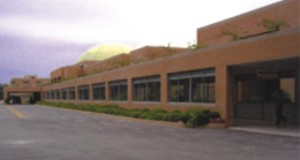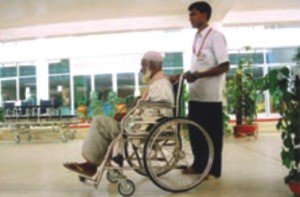|
Endeavour
Khwaja Yunus Ali Medical College and Hospital
The Dream of a Saint
Dr. M. Fouzul Kabir Khan
Believe it or not, about 150 kilometres from Dhaka, there exists at Enayetpur in Sirajganj a world-class medical facility by the river Jamuna. This sprawling facility covering 87 acres of land comprises about 1 million square feet of construction and hosts a 586- bed capacity hospital with 400 rooms for guests accompanying patients, a medical college and a school. The hospital has full-fledged facilities including Cardiology and Endocrinology, ENT, Obstetrics and Gynaecology, Medicine, Nephrology, Nutrition and Dietetics, Paediatrics Lab and Pathology.
 While visiting the facility, my first reaction was that the huge investment was totally unjustified. The location was bad: threatened by erosion of Jamuna, and far from the crowd that could utilise the quality of services offered by the facility. We do not even have such a facility in Dhaka. The prospect of the hospital's revenue meeting the operating costs, let alone a return on investment, was indeed very slim. Wait a minute; I was perhaps applying the wrong tools in my analysis. The facility was built to fulfill the prophecy, 60 years back, made by the saint Hazrat Khwaja Yunus Ali (R) who came to this site and hammered a wooden peg into the land and said "One day there will grow an establishment on this very land for the welfare of people not only of the locality but for the society." The name Khwaja Yunus Medical College and Hospital (KTAMCH) has its origin in this legend. The facility is an example of altruism par-excellence! This became clearer to me as one of the family members behind the project, who was giving us a guided tour, refused to admit that they are the owners of the facility but merely a Khadem (caretaker). While visiting the facility, my first reaction was that the huge investment was totally unjustified. The location was bad: threatened by erosion of Jamuna, and far from the crowd that could utilise the quality of services offered by the facility. We do not even have such a facility in Dhaka. The prospect of the hospital's revenue meeting the operating costs, let alone a return on investment, was indeed very slim. Wait a minute; I was perhaps applying the wrong tools in my analysis. The facility was built to fulfill the prophecy, 60 years back, made by the saint Hazrat Khwaja Yunus Ali (R) who came to this site and hammered a wooden peg into the land and said "One day there will grow an establishment on this very land for the welfare of people not only of the locality but for the society." The name Khwaja Yunus Medical College and Hospital (KTAMCH) has its origin in this legend. The facility is an example of altruism par-excellence! This became clearer to me as one of the family members behind the project, who was giving us a guided tour, refused to admit that they are the owners of the facility but merely a Khadem (caretaker).
The guided tour revealed the following: the facility is indeed world-class; buildings, equipment, and other facilities--yes, I have visited some world class facilities such as Beth Israel Hospital, Mount Elizabeth Hospital etc. The facility was grossly underutilised: out of 586 beds capacity only about 100 were occupied. The doctors are all non-practising and resident at the hospital. Contrary to popular belief, the predominantly rural users of the facility have kept it clean; you could use the restrooms--something that cannot be said about hospitals in Dhaka. Apart from the specialist doctors, most of the staff are from the locality--nearly 150 men and women neatly dressed and quietly providing their services. The medical college had its first intake of 53 students this year. Top medical schools of the world such as Harvard, Johns Hopkins and UCLA are discussing collaboration programmes with the KYAMCH management.
 As I mentioned earlier, from an economic and commercial viewpoint the project is an absurd idea. However, absurdities such as KYAMCH make living worthwhile and memorable. I wish there were a few more absurdities such as KYAMCH in the country. The world needs many more such philanthropic investors. Now that the dream Hospital and Medical College is in existence, we have to protect this asset from erosion of the Jamuna. The asset has no economic or financial justification as a private property. Public service could be the sole justification of the asset. Therefore, public resources need to be devoted to protect it from the onslaught of the Jamuna. Moreover, it would be a pity to leave such an excellent facility underutilised. To ensure this, approach roads to hospital need to be maintained and upgraded. The 22.5 kilometre road from Koddar Mor or Saidabad to Enayetpur, where the facility is located, is already in bad condition and has been breached by the floodwaters in a number of places. With support from the government and the development partners, the hospital has the potential of becoming a shining example of public-private partnership in Bangladesh. As I mentioned earlier, from an economic and commercial viewpoint the project is an absurd idea. However, absurdities such as KYAMCH make living worthwhile and memorable. I wish there were a few more absurdities such as KYAMCH in the country. The world needs many more such philanthropic investors. Now that the dream Hospital and Medical College is in existence, we have to protect this asset from erosion of the Jamuna. The asset has no economic or financial justification as a private property. Public service could be the sole justification of the asset. Therefore, public resources need to be devoted to protect it from the onslaught of the Jamuna. Moreover, it would be a pity to leave such an excellent facility underutilised. To ensure this, approach roads to hospital need to be maintained and upgraded. The 22.5 kilometre road from Koddar Mor or Saidabad to Enayetpur, where the facility is located, is already in bad condition and has been breached by the floodwaters in a number of places. With support from the government and the development partners, the hospital has the potential of becoming a shining example of public-private partnership in Bangladesh.
Dr. M. Fouzul Kabir Khan is an Economics and Finance practitioner and co-author of the book Financing Large Projects published by Prentice Hall.
Copyright
(R) thedailystar.net 2005 |
